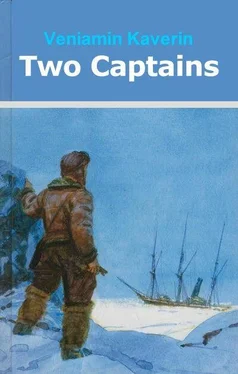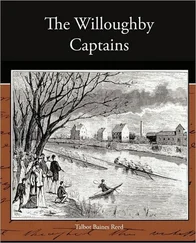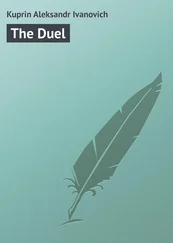Chapter Three
THE PETITION
I am sure that in the long run I would have managed it somehow, if Mother hadn't taken ill the next morning. She had always seemed a bit queer to me, but I had never seen her so queer before.
Previously, when she would suddenly start standing at the window for hours on end, or jumping up in the middle of the night and sitting at the table in her nightdress until the morning. Father would take her back to the home village for a few days, and she would come back recovered. But Father wasn't there any more, and, besides, it was doubtful whether the trip would have helped her now.
She stood in the passage, bareheaded and barefooted, and did not even turn her head when somebody came into the house. She was silent all the time, except when she uttered two or three words in a distracted manner.
What's more, she seemed to be afraid of me, somehow. When I started to "speak", she stopped up her ears with a tortured expression. She passed a hand over her eyes and forehead as if trying to recollect something. She was so queer that even Aunt Dasha crossed herself furtively when Mother, in answer to her pleadings, turned and fixed her with a dreadful stare.
It must have been a fortnight before she came round. She still had fits of absent-mindedness, but little by little she began to talk, go outside into the yard and work. Ever more often now the word "petition" was on her lips. The first to utter it was old Skovorodnikov, then Aunt Dasha picked it up, and after her the whole yard. A petition must be lodged!
That day Mother went out and took us with her-me and my sister. We were going to the "Chambers" to hand in a petition. The "Chambers" were a dark building behind tall iron railings in Market Square.
My sister and I waited for a long time, sitting on an iron seat in the dimly lit high-ceilinged corridor. Messengers hurried to and fro with papers, doors slammed. Then Mother came back, seized my sister's hand, and we all started off at a run. The room we went into was barriered off, and I couldn't see the person to whom Mother was speaking and bowing humbly. But I heard a cold indifferent voice, and this voice, to my horror, was saying something which I alone in all the world could disprove.
"Ivan Grigoriev…" I heard the rustle of pages being turned over. "Article 1454 of the Criminal Code. Premeditated murder. What do you want, my dear woman?"
"Your Honour," my mother said in a tense unfamiliar voice, "he's not guilty. He never killed anyone."
"The court will go into that."
I had been standing all the time on tiptoes, my head thrown back so far that it bade fair to drop off, but all I could see across the barrier was a hand with long dry fingers, in which a pair of spectacles was being slowly dangled.
"Your Honour," Mother said again, "I want to hand in a petition to the court. Our whole yard has signed it."
"You may lodge a petition on payment of one ruble stamp duty."
"It's been paid. It wasn't his knife they found, Your Honour."
Knife? Had I heard aright?
"On that point we have the evidence of the accused himself."
"Maybe it was a week since he lost it."
Looking up, I could see Mother's lips trembling.
"Someone would have picked it up, my dear woman. Anyway, the court will go into that."
I heard nothing more. At that moment it dawned on me why my father had been arrested. It wasn't he, it was me who had lost that knife-an old clasp-knife with a wooden handle. The knife I had searched for the morning after the murder. The knife which could have dropped out of my pocket when I bent over the watchman on the pontoon bridge. The knife on whose handle Pyotr Skovorodnikov had burned out my name with a magnifying glass.
Looking back on it now I begin to realise that the officials who sat behind high barriers in dimly-lit halls would not have believed my story anyway. But at the time! The more I thought about it the heavier it weighed on my mind. It was my fault, then, that they had arrested Father. It was my fault that we were now going hungry. It was my fault that Mother had had to sell the new cloth coat for which she had been saving a whole year, my fault that she had had to go to the "Chambers" and speak in such an unfamiliar voice and bow so humbly to that unseen person with the long, horrible, dry fingers in which there slowly dangled a pair of spectacles.
Never before had I felt my dumbness so strongly.
Chapter Four
THE VILLAGE
The last of the rafts had passed down the river. The lights in the rafters' drifting huts were no longer visible at night when I woke up. There was emptiness on the river, emptiness in the yard and emptiness in the house.
Mother did washing in the hospital. She left the house first thing in the morning while we were still asleep, and I went to the Skovorodnikovs and listened to the old man swearing to himself.
Grey and unkempt, in steel-rimmed glasses, he sat on a low leather-covered stool in the little dark kitchen, stitching boots. When he was not stitching boots he was making nets or carving figures of birds and horses out of aspen wood. He had brought this trade with him from the Volga, where he had been born.
He was fond of me, probably because I was the only person he could talk to without being answered back. He cursed doctors, officials, tradesmen, and, with especial virulence, priests.
"If a man be dying, dare he murmur against it? The priests say no. But I say yes! What is murmuring?"
I didn't know what murmuring meant.
"Murmuring is discontent. And what is discontent? It's wanting more than's been allotted to you. The priests say you mustn't. Why?"
I didn't know why.
"Because 'dust thou art and to dust thou shalt return'. To the earth, that is."
He gave a bitter laugh.
"And what does the earth need? No more than is allotted to it."
So it was autumn now, and even the crabs, which had lately become a staple item in our domestic fare, had hidden themselves away in their holes and refused to be enticed out by my frogs. We were going hungry, and Mother finally decided to send me and my sister to the village.
I had never been in the country, but I knew that my father had a farm there. A farm! How disappointed I was on discovering that this was simply a cottage with a household plot, a little, overgrown vegetable garden in the middle of which stood a few aged apple trees.
The house was a small one, which having once slumped on its side, remained leaning sideways. The roof was tilted, the window-panes were smashed and the base logs were bent. The Russian stove seemed to be all right until we started a fire in it. Smoke-blackened benches were ranged around the walls, and in one corner hung an icon, on whose grimy panels a face could just be made out.
Whatever its faults, it was our house, and we undid our bundles, stuffed out mattresses with straw, glazed the windows and settled down to live in it.
Mother stayed with us only about three weeks, then went back to town. Grandma Petrovna agreed to take her place. She was Father's aunt, and that made her a sort of grandmother to us. She was a kind-hearted old woman, even though it was hard to get used to her grey beard and moustache. The only drawback was that she herself needed looking after. In fact, my sister and I looked after her all the winter, carrying water and heating her stove, since her cottage, which was little better than ours, was quite close.
That winter I grew attached to my sister. She was getting on for eight. Everyone in our family was dark, but she was fair, with fuzzy little pigtails and blue eyes. We were all rather taciturn, especially Mother, but my sister would start off talking the moment she opened her eyes. I never saw her cry, and it was the easiest thing in the world to make her laugh. Her name was Sanya, too, the same as mine-1 being Alexander and she Alexandra. Aunt Dasha had taught her to sing, and every evening she sang long songs in such a serious, thin little voice that you couldn't help laughing.
Читать дальше












